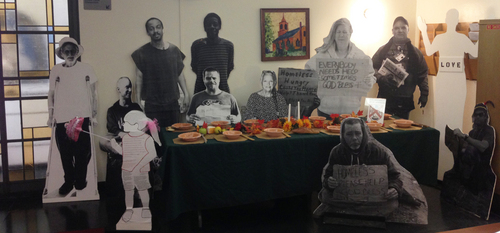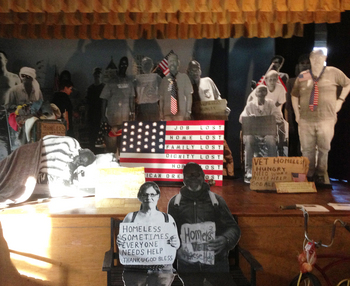She admits she was nervous the first time she asked a homeless person if she could buy their cardboard sign off them, but Ann Arbor painter Susan Clinthorne is glad she did. That was three years ago, when she first got inspired to collect them for an art project about homelessness.
Some of her discomfort came from being afraid to approach a homeless stranger. How would they react? But her apprehension was just as much about not wanting to offend or exploit anyone. Already a compassionate person, and wanting to gain a deeper understanding of what it means to give, she ended up learning lessons about both.

The Dinner Guests by Susan Clinthorne and Sally Thielen at St. Andrew's Episcopal Church
On display at St. Andrew's Episcopal Church in downtown Ann Arbor through Sunday, the sisters' art installations are spread across 3 rooms in the church—Parish Hall, the sanctuary, and the foyer near the church offices.
At its heart, the sisters' art project is an entirely "nonprofit" way to inspire fundraising, volunteerism, and compassion for homeless people. Many churches have displayed installations, along with art exhibitions like this year's ArtPrize in Grand Rapids. It seems to have left a tangible impact along its journey.
"Churches who have used it has said they have had an increase in volunteerism," Clinthorne says. Several have used it for fundraisers.
Perhaps the biggest change in her, Clinthorne went from feeling afraid to being "totally comfortable" with the people she and her sister have met along the way, she says. She hopes the art will inspire people to feel the same way.
"Once you get to know them, they become like your guests. You are comfortable enough with them that you would invite them to be your dinner guests," she says as she looks upon "The Dinner Guests," an art installation located near the church's offices.
Cut-outs of homeless people gather around a dinner table, posed and usually smiling. Some hold up signs. The table is set with ceramic bowls the sisters made. Each has a positive word scratched into it - joy, faith, compassion, and so on. A blank white piece of form core board that, especially in a church, resembles Jesus at the Last Supper joins them at the table. On his chest, the word "LOVE" translates to anyone, the religious and secular alike.
Keys in some of the cut-outs' hands indicate who has found a home since their photograph was taken. Clinthorne identifies it as an important symbol. "There is a key to solving the homelessness problem - compassion. It is the key and solution," she explains.

Susan Clinthorne and Sally Thielen fill the Parish Hall at St. Andrew's Episcopal Church with a large art installation on homelessness
On one hand, the black and white cut-outs of people feel realistic. You can approach them and sense the presence of a real person. The art installations at St. Andrew's do well to encourage the viewer to see the humanity and individuality of each homeless person. As far as increasing awareness, the art does its job.
On the other hand, by their nature, facsimiles are not the real thing. The art installations only do half the work. What remains to be seen is how one's reaction to encountering a homeless person in the flesh might change.
Two cut-outs and a couple of cardboard signs are on display in the church sanctuary, right up near the pulpit. Sitting in the pews, there is no way you cannot look at them. "You come face to face with a person. If you see them on the street you can look the other way. But here you can take time to look at him and know he's just a man. It breaks down the barrier and take out the element of fear," Clinthorne explains.
In the real world, in her experience, "most homeless people are happy to sit and talk with you. They are tired of people walking by pretending they don't exist," Clinthrone says. I will add that an effect it had on me was that if I ever run into any of the individuals, I will probably ask them about it and pay them a compliment for participating in the project. The potential to gain a new perspective is certainly there.
St. Andrews Episcopal Church is located at 306 N. Division St.